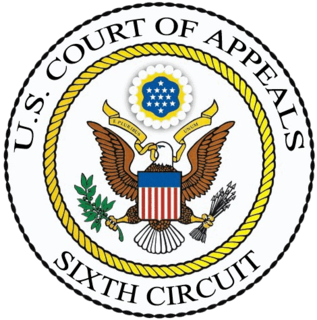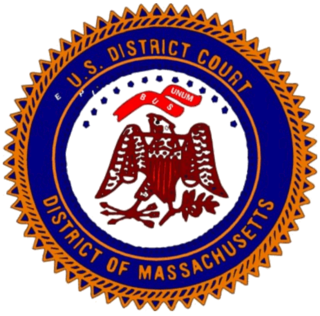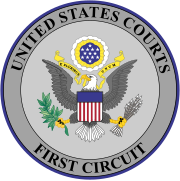
The Omnibus Crime Control and Safe Streets Act of 1968 was legislation passed by the Congress of the United States and signed into law by President Lyndon B. Johnson that established the Law Enforcement Assistance Administration (LEAA). Title III of the Act set rules for obtaining wiretap orders in the United States. The act was a major accomplishment of Johnson's war on crime.

The Electronic Communications Privacy Act of 1986 (ECPA) was enacted by the United States Congress to extend restrictions on government wire taps of telephone calls to include transmissions of electronic data by computer, added new provisions prohibiting access to stored electronic communications, i.e., the Stored Communications Act, and added so-called pen trap provisions that permit the tracing of telephone communications . ECPA was an amendment to Title III of the Omnibus Crime Control and Safe Streets Act of 1968, which was primarily designed to prevent unauthorized government access to private electronic communications. The ECPA has been amended by the Communications Assistance for Law Enforcement Act (CALEA) of 1994, the USA PATRIOT Act (2001), the USA PATRIOT reauthorization acts (2006), and the FISA Amendments Act (2008).
The USA PATRIOT Act was passed by the United States Congress in 2001 as a response to the September 11, 2001 attacks. It has ten titles, each containing numerous sections. Title II: Enhanced Surveillance Procedures granted increased powers of surveillance to various government agencies and bodies. This title has 25 sections, with one of the sections containing a sunset clause which sets an expiration date, December 31, 2005, for most of the title's provisions. This was extended twice: on December 22, 2005 the sunset clause expiration date was extended to February 3, 2006 and on February 2 of the same year it was again extended, this time to March 10.

NSA warrantless surveillance — also commonly referred to as "warrantless-wiretapping" or "-wiretaps" — refers to the surveillance of persons within the United States, including U.S. citizens, during the collection of notionally foreign intelligence by the National Security Agency (NSA) as part of the Terrorist Surveillance Program. In late 2001, the NSA was authorized to monitor, without obtaining a FISA warrant, the phone calls, Internet activity, text messages and other communication involving any party believed by the NSA to be outside the U.S., even if the other end of the communication lay within the U.S.

American Civil Liberties Union v. National Security Agency, 493 F.3d 644, is a case decided July 6, 2007, in which the United States Court of Appeals for the Sixth Circuit held that the plaintiffs in the case did not have standing to bring the suit against the National Security Agency (NSA), because they could not present evidence that they were the targets of the so-called "Terrorist Surveillance Program" (TSP).
United States v. U.S. District Court, 407 U.S. 297 (1972), also known as the Keith case, was a landmark United States Supreme Court decision that upheld, in a unanimous 8-0 ruling, the requirements of the Fourth Amendment in cases of domestic surveillance targeting a domestic threat.

The following is a section summary of the USA PATRIOT Act, Title II. The USA PATRIOT Act was passed by the United States Congress in 2001 as a response to the September 11, 2001 attacks. Title II: Enhanced Surveillance Procedures gave increased powers of surveillance to various government agencies and bodies. This title has 25 sections, with one of the sections containing a sunset clause which sets an expiration date, 31 December 2005, for most of the title's provisions. On 22 December 2005, the sunset clause expiration date was extended to 3 February 2006.

The Stored Communications Act is a law that addresses voluntary and compelled disclosure of "stored wire and electronic communications and transactional records" held by third-party internet service providers (ISPs). It was enacted as Title II of the Electronic Communications Privacy Act of 1986 (ECPA).

In re DoubleClick Inc. Privacy Litigation, 154 F. Supp. 2d 497 ("DoubleClick"), had Internet users initiate proceedings against DoubleClick, alleging that DoubleClick's placement of web cookies on computer hard drives of Internet users who accessed DoubleClick-affiliated web sites constituted violations of three federal laws: The Stored Communications Act, the Wiretap Statute and the Computer Fraud and Abuse Act.

United States v. Hubbard was a 1978 criminal court case charging Mary Sue Hubbard and several other members of the Church of Scientology with violations of various laws including:

Jean v. Massachusetts State Police, 492 F.3d 24 is a case concerning the legality of posting a video on the internet obtained by another source through illegal means, which in this case involve use of a nanny cam to record others. The plaintiff filed for a permanent injunction against the defendants, who issued a cease-and-desist order regarding a video posted on the plaintiff's website. The defendants claimed the video was in violation of Massachusetts law M.G.L c 272 § 99, which defines the secret recording of audio without the consent of the persons recorded as interception, and subject to prosecution as a felony due to the presence of audio in the videorecording. The court's decision drew heavily off of previous court case Bartnicki v. Vopper. The court's decision held that it was legal to post such a video which was lawfully obtained from another, especially regarding a matter of public concern.
Konop v. Hawaiian Airlines, Inc., 236 F.3d 1035 (2001) was a case in which the United States Court of Appeals for the Ninth Circuit affirmed in part and overturned in part the ruling of the United States District Court for the Central District of California. The court held that the defendant, Hawaiian Airlines, could not be held liable for violation of the federal Wiretap Act when it gained access to the plaintiff's website because the contents of the plaintiff's website were in storage, and thus could not be intercepted under the meaning of the Wiretap Act.

United States v. Nosal, 676 F.3d 854 was a United States Court of Appeals for the Ninth Circuit decision dealing with the scope of criminal prosecutions of former employees under the Computer Fraud and Abuse Act (CFAA). The Ninth Circuit's first ruling established that employees have not "exceeded authorization" for the purposes of the CFAA if they access a computer in a manner that violates the company's computer use policies—if they are authorized to access the computer and do not circumvent any protection mechanisms.

United States v. Spy Factory, Inc. was a criminal case dealing with the largest chain of surveillance equipment shops in the United States, the San Antonio, Texas-based Spy Factory. The store and its officers Ronald Kimball, Marlin Richardson and Tracy Edward Ford were indicted on a total of 70 counts related to smuggling of and illegal trade in equipment used for wiretapping and surveillance. Despite motions to dismiss the case because of the alleged vagueness of 18 U.S.C. § 2512 and other issues, the company and all three officers pleaded guilty and were convicted.
Several statutes, mostly codified in Title 18 of the United States Code, provide for federal prosecution of public corruption in the United States. Federal prosecutions of public corruption under the Hobbs Act, the mail and wire fraud statutes, including the honest services fraud provision, the Travel Act, and the Racketeer Influenced and Corrupt Organizations Act (RICO) began in the 1970s. "Although none of these statutes was enacted in order to prosecute official corruption, each has been interpreted to provide a means to do so." The federal official bribery and gratuity statute, 18 U.S.C. § 201, the Foreign Corrupt Practices Act (FCPA) 15 U.S.C. § 78dd, and the federal program bribery statute, 18 U.S.C. § 666 directly address public corruption.
Schmuck v. United States, 489 U.S. 705 (1989), is a United States Supreme Court decision on criminal law and procedure. By a 5–4 margin it upheld the mail fraud conviction of an Illinois man and resolved a conflict among the appellate circuits over which test to use to determine if a defendant was entitled to a jury instruction allowing conviction on a lesser included charge. Justice Harry Blackmun wrote for the majority; Antonin Scalia for the dissent.








